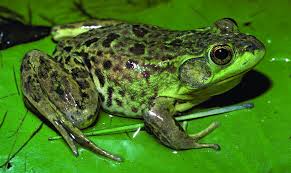Look up. See the stars rating this post? For experimental purposes I’d like everyone who visits this post to rate it with at least one star. Please do NOT give five stars. Thank you.
It Wasn’t Me
i don’t know why the frog is green
i don’t know why the frog is dead
i didn’t kill it much the cat did
the cat ate half the frog
but not the legs
are you hungry?
i don’t know why
i don’t know how
Nissa Annakindt
Sep. 9, 2014
Finding Keywords in Poems
A Lesson for self-study
Some poets— especially those who have read Sandford Lyne’s ‘writing poetry from the inside out’— compose poems using keywords. I have used this method myself with some success.
But where do you find good keywords to use? Other than Mr. Lyne’s book, that is? One method is to find keywords in someone else’s poem.
This is how you do it. Get out a piece of paper— right now— and read through the poem ‘It Wasn’t Me’. Every time a word catches your attention, write the word down. On the paper.
Don’t pick out the ‘poetic’ words or the words you think a teacher would want you to write down. Write down the words that moved, interested or horrified YOU. There are no right or wrong answers that can be graded by someone else.
These should be single words, as this is a keyword exercise. Phrases will come in another lesson.
Try to get at least 4 keywords. Or eight, or 12. If you can get that many from such a short poem. If you have 5 or 9 words, look over your list and omit the weakest, least impactful word.
Get out your poetry notebook. If you don’t have one, run out and get one. Right now. A composition book works fine. Open your notebook and write at the top of a page ‘Keywords’. Then, underneath, write ‘It Wasn’t Me/Nissa Annakindt’. Underneath that write your keywords in groups of four.
Let the words ferment in your notebook for a month or more. Then, some fine day when you feel like writing a poem from keywords, open it up to your keywords page and select your keywords. It is perfectly fine to NOT use the keyword groups of four but instead to mix-and-match from the words on the page. You may also use 2 groups of keywords if that works better. But you might also go through your keyword lists and use the groups as they are written down.
You will want to assemble many, many groups of keywords for your poetry writing. You need not use keywords in every poem you assemble— for me the method doesn’t work as well for writing sijo— but when you do use them, it’s good to have a wide choice. So, let us try another poem— this time one NOT written by me, but by a Korean sijo poet who lived a long time ago, Song Soon.
Birds, do not blame the blossoms
For falling;
It is not their fault
That the wind scatters them.
And what is the good of chiding spring
Just as she is leaving?
Find and write down keywords from this poem as well. Since it doesn’t have a title, use the first line for your keyword notebook ‘headline’ for the keyword groups.
Have your keywords? Please post a comment with a group of keywords you found in one of these poems. For extra credit, post 2 keyword groups, one for each poem.
Shared on Poetry Pantry 283. Got a blog? Write poems? Share them on Poetry Pantry!
warning: commercial message follows.
 Today I checked on ‘Where the Opium Cactus Grows’, my first poetry book. I’ve only made 10 sales since publication in 2011. So I’d like to ask any stray reader of the blog to do me a favor: could you share this link http://www.amazon.com/Where-Opium-Cactus-Grows-Annakindt/dp/0557939135 on your blog, Facebook or Twitter? (If you are rich, perhaps you’d consider actually buying a copy yourself?) My goal is to sell 10 more copies of this book.
Today I checked on ‘Where the Opium Cactus Grows’, my first poetry book. I’ve only made 10 sales since publication in 2011. So I’d like to ask any stray reader of the blog to do me a favor: could you share this link http://www.amazon.com/Where-Opium-Cactus-Grows-Annakindt/dp/0557939135 on your blog, Facebook or Twitter? (If you are rich, perhaps you’d consider actually buying a copy yourself?) My goal is to sell 10 more copies of this book.

Interesting technique…
Such an inspiring piece 🙂
A wonderful method…
‘Green dead, kill, hungry’ now I will have to write these in my poetry notebook and come back to them in spring! 🙂
Liking your ambition here, Nissa – always interesting to read you… Have a great Christmas… With Best Wishes Scott
hungry legs … I think that could be a springboard for a poem.
on hungry legs
we seek the hidden roads
close to the abyss
frog
green –
Why why why?
Sunday smiles
much love…
Hmmm …**** (4 stars 🙂 )
You captured my attention.
not sure where you leave the stars…but, I found the post interesting and I did write down some keywords in my journal..
Yes, you captured my attention, too. Smiles.
very interesting….
Spreading wisdom! Thanks!
Intriguing, I’ll see if it inspires me in a day or two.
interesting method.
i have picked some words and let them ferment in a notebook. will look at them again in a month or so (if i remember). 🙂